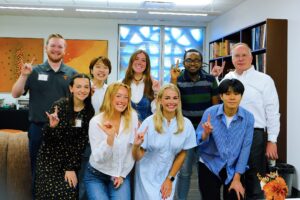AUSTIN, Texas—A new institute to provide the intellectual leadership and infrastructure for conducting world-class interdisciplinary research in the fields of computational science, engineering and technology has been created at The University of Texas at Austin.
The Institute for Computational Engineering and Sciences (ICES) was made possible by a $38 million investment, $15 million from an anonymous donor, $8 million from industrial partners and $15 million in university matching funds, said Dr. Larry R. Faulkner, president of The University of Texas at Austin. The industrial partners are Dell Computer Corporation; Cray, Incorporated; IBM; Force10 Networks; Microsoft; Nortel; Platform Computing; StorageTek Computing; Sun; TeraBurst; Myricom, Inc.; and United Devices.
“Computational engineering and technology are arenas that will affect virtually every aspect of our lives in the 21st century,” Faulkner said. “The technological advancement of our state and nation hinges on these critical fields of endeavor.”
The initiative includes the creation of new endowed chairs in key areas of computational science and technology, including distributed and grid computing, computational biology or biomedical science and engineering, and computational mechanics and materials.
ICES will include and build on the existing programs of the Texas Institute for Computational and Applied Mathematics (TICAM), which will be strengthened and absorbed by ICES. The institute also will receive substantial expansions of endowments for supporting research operations, hosting visiting scholars, acquiring advanced information technology equipment and providing technical support to ICES researchers.
The initiative also includes the acquisition and operation of state-of-the-art high performance computing (HPC), scientific visualization, massive data storage and high-speed network equipment that will be supported by the Texas Advanced Computing Center (TACC).
The new HPC systems will be two of the most powerful computing systems dedicated to academic research in the world. One will be a Cray-Dell cluster with nearly 600 processors and a peak performance of more than three trillion operations per second (teraflops). The other HPC system will consist of an IBM Power4 computing system with more than 200 processors and more than one teraflop.
Additional new equipment will provide fast access to and storage of the massive amounts of data that will be generated by these terascale HPC systems and enable large-scale data visualization and knowledge discovery.
“The University of Texas at Austin has become a national model for public and private partnerships in grid computing,” said Larry Smarr, professor of computer sciences and engineering at the University of California at San Diego, and a leading authority on grid computing. “The university has built a strong academic team which can make major contributions to computational sciences using high performance grid technologies.”
The institute is housed within the world-class Applied Computational Engineering and Sciences building in the center of The University of Texas at Austin campus. This six-story, 186,000-square-foot structure contains state-of-the-art technology to support interdisciplinary research and graduate study in computational science and engineering.
Designed to attract outstanding students, scientists and engineers from around the world, the facility houses a 2,900-square-foot visualization lab, bandwidth-intensive research space for more than 300 graduate students, electronic seminar and videoconferencing rooms and fully equipped offices for visiting researchers.
Professor J. Tinsley Oden will be director of the new institute. Organizationally, ICES reports to Dr. Juan Sanchez, the vice president for research, and the director holds the title of associate vice president for research.
“I believe there are few, if any, programs worldwide in computational engineering and science with the breadth and level of commitment one can find here in ICES,” said Oden, a member of the National Academy of Engineering who holds a Cockrell Family Regents Chair in Engineering. “The university has been committed to developing leading academic and research programs in computational engineering and science for some time. These new investments and initiatives and the significant increase in the breadth of interdisciplinary programs represent important steps towards fulfilling that goal.”
For more information contact: Dr. Tinsley Oden, College of Engineering, 512-471-3312, or
Sheila Allee, Office of Resource Development, 512-475-9672.



